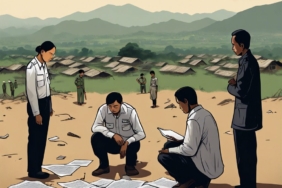A New Life in Japan: Ngu Thazin’s Journey
Ngu Thazin, a determined young woman from Myanmar, aspired to leave her war-torn homeland in search of a brighter future. Her journey led her to Japan, a country she believed offered safety and opportunity.
In Myanmar, Ngu dedicated herself to her studies, mastering the Japanese language and earning a degree in chemistry from one of the nation’s most esteemed universities. Despite her academic achievements, she willingly accepted a job in Japan where she provides essential care for elderly residents in a nursing home, a role that involves changing diapers and assisting with daily hygiene.
“To be honest, I want to live in Japan because it is safe,” Ngu shared, expressing her hopes of eventually passing the necessary exams to become a licensed caregiver. “And I want to send money back to support my family.”
This sentiment resonates with many foreign workers in Japan, as the country faces a critical shortage of labor due to its declining and aging population. Since 2007, the number of foreign workers has surged fourfold, exceeding two million amidst a national population of 125 million. Many of these individuals have fled low wages, political oppression, or armed conflict in their home countries, seeking better lives and opportunities.
However, despite the growing presence of foreign workers in various sectors—ranging from convenience store cashiers to hotel clerks and restaurant servers—Japan’s attitude towards these individuals remains complex and often ambivalent. Political leaders exhibit hesitance to establish pathways for foreign workers, especially those in lower-skilled positions, to secure permanent residency. This reluctance could eventually hinder Japan’s competitiveness against neighboring countries like South Korea and Taiwan, as well as farther-flung nations such as Australia and those in Europe, all of which are also in pursuit of a robust labor force.
Living in shared accommodations with fellow foreign workers in Maebashi, Ngu Thazin faces the challenges posed by Japan’s intricate immigration policies. The political resistance to immigration, combined with a public that can sometimes be hesitant to embrace newcomers, has resulted in a vague legal framework and limited support systems for foreigners seeking to establish roots in Japan.
According to government data, foreign-born workers in Japan earn, on average, about 30 percent less than their Japanese colleagues. This disparity not only reflects the economic challenges faced by these workers but also perpetuates a cycle of insecurity. Many foreign employees navigate precarious relationships with their employers, often driven by the fear of jeopardizing their residency rights. Consequently, opportunities for career advancement remain elusive, making the path to a stable and fulfilling life in Japan all the more difficult.


















